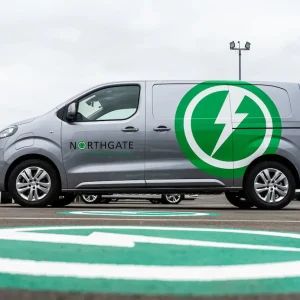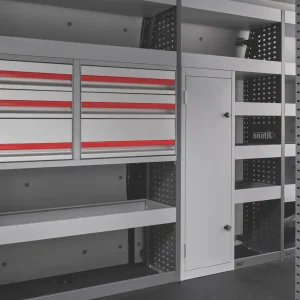What with dramatic upheavals in the high street as more and more shops close plus a lack of clarity over what will happen post-Brexit, Britain’s economy is having to cope with a period of uncertainty.
As a consequence, van operators might be forgiven for acquiring their vehicles under short-term rental agreements rather than committing themselves to fixed-term contract hire deals. Go the former route, the argument runs, and it will be easy to send your vans back to the hire firm if the economy tanks; choose the latter option and you might be stuck with them unless you want to pay hefty penalty charges.
Three- to four-year contract hire agreements remain popular, however, says Alison Bell, marketing director at Venson Automotive Solutions, a fleet management solutions provider –
and it’s all due to price. Customers willing to sign up to a long-term contract will get a better deal than those only prepared to commit to a short-term arrangement.
“What businesses are primarily interested in is the bottom line,” she says. “It’s all very much price-driven.”
With some 5,500 LCVs on its books, Venson has noted that more companies either want to renew existing contract hire agreements or sign up to new deals this year than was the case last year. Some had probably extended their existing leases because they were unsure of what to do in an uncertain climate, Bell suggests, run vehicles for longer than they should have done, then concluded that they had no choice but to replace them.
Her view that price is one of the key considerations when clients make their decisions is shared by Activa Contracts MD Ian Hill. “If you want maximum flexibility then you have to pay for it,” he says.
The leasing company is responsible for around 2,000 vans and offers customers three different options: short-term daily rental; flexible long-term rental, which involves the client agreeing to take the vehicle for at least three months on the understanding it can be returned at any time thereafter; and a long-term fixed deal, which equates to contract hire. A flexible long-term rental package is roughly 35% cheaper a week than taking a van on short-term hire over the same period, says Hill. Contract hire is approximately 50% cheaper.
While contract hire arrangements continue to appeal to customers on price grounds, Hill has detected increased interest in flexible long-term rental as a compromise. “The demand doesn’t appear to be driven by concerns about Brexit, though,” he observes.
Many firms that opt for flexible rental do so because they have short-term contracts to service, he says, and if the work they have taken on is only going to last for six months there seems little point in inking a three-year deal.
Enterprise Flex-E-Rent’s commercial vehicle hire fleet is 27,000-strong and operates out of 22 depots, and MD Danny Glynn suspects Brexit could be an influencing factor when operators make their choices.
“It is causing managers to take more time over making decisions and to ensure they can hedge their bets,” he says. “They are concerned something will happen to the economy when we exit; something that is unforeseen.”
That works in rental’s favour.
Flexible
Northgate Vehicle Hire pioneered flexible extended rental details. Not surprisingly, fleet director Tim Bailey strongly advocates them.
“We’re seeing a shift away from vehicle ownership towards flexible rental because it doesn’t require capital spend and gives businesses consistency of costs during a time of turbulence,” he says.
“In any major economic shift there will be winners and losers,” he continues. “To maximise chances of success, people must be able to scale their van needs up or down – not be stuck in the handcuffs of a fixed leasing agreement or burdened with depreciating assets.”
Nor do people in this situation necessarily have to rent new vehicles.
“In this climate, and with austerity still in full swing, we’re seeing a surge in interest in our ‘We Buy, You Rent’ product,” says Bailey. “That’s where we buy a customer’s existing vans, injecting cash back into the business. The customer then switches from ownership to a rental agreement for their vehicles.”
The first few months of this year certainly saw an increasing number of fleet managers looking to rent vans under extended rental deals that offered them flexibility, says Simon Ridley, managing director of hire company Dawsongroup Vans. He believes the sentiment in favour of such deals remains an underlying theme.
This year saw Dawsongroup acquire former TOM Group subsidiary Transflex Vehicle Rental, adding some 3,600 vans to its line-up. With 13 sites spread nationwide, Dawsongroup vans now operates an 8,500-strong fleet.
One reason why some firms take vehicles on long-term contract hire agreements is that they may need to have them equipped with highly specialised bodywork and ancillary equipment.
Lessors are willing to do this if they know they will not suddenly have them sent back at short notice and be faced with the headache of either disposing of them or renting them out again.
Opt for flexible long-term rental and you may be able to specify some basic conversion work – racking, a tow-bar, cab-top amber beacons and so on – but your scope is likely to be otherwise limited.
A good example of a straightforward contract hire agreement is one signed by Grand Union Housing Group (GUHG) to take 45 LCVs – a mixture of Vauxhall Vivaro vans and Movano tippers – from Ogilvie Fleet over five years/75,000 miles. Developing and providing affordable housing and related services in Bedfordshire, Buckinghamshire and Northamptonshire, GUHG used to buy its vehicles outright, and its vehicles are used by a variety of tradespeople.
“Value for money is clearly vital, but the key reason for opting for contract hire and moving away from outright purchase was that it delivered budgetary simplicity due to monthly fixed costs,” says GUHG health, safety and business services manager Richard Pearce, who is responsible for the group’s fleet. “We previously found that service, maintenance and repair costs could escalate rapidly in the final year or two of a vehicle’s operating life, and that could impact on budget certainty.”
It is worth noting that contract hire agreements are by no means as rigid as they used to be, with five-year deals with break clauses every 12 or 24 months not unknown. Customers may also want to be able to offload a certain percentage of the vehicles they have taken during the course of the agreement, which may make one wonder where contract hire ends and long-term rental begins.
Diesel
According to Ridley of Dawsongroup Vans, as yet there is no indication that firms are renting rather than acquiring diesel vans because they worry that diesels may soon be barred from certain city centres.
“Some fleets are asking our opinion about what may happen in future though,” he adds.
Europcar director of commercial vehicle services, Stuart Russell, fears some fleets may not be taking the prospect of tighter environmental rules seriously enough. Europcar has been buying electric light commercials when customers ask for them and is committed to buying more.
The company has almost 7,000 vans available for rent through 99 outlets, including 14 major sites that can each store 200.
“The aim is for 20% of the fleet to be electric by 2020,” he continues. It’s a big commitment to zero-emission technology.
“We’re definitely having conversations about electric vans with customers and those conversations have been going on for a while,” says Enterprise Flex-E-Rent’s Glynn. “I think it’s an area that’s going to develop.”
Enterprise Flex-E-Rent is adding battery-powered light commercials to its fleet when customers specifically request them.
Tim Bailey of Northgate Vehicle Hire is not convinced that electric vans are a viable option at present.
“They’re not ready or able to serve customers fully yet,” he observes, “however good the intention.”
A factor that is definitely influencing the market is the demand for near-instant availability of vehicles, says Europcar’s Russell.
“Operators want to be able to obtain vans at the drop of a hat,” he says. “They want them ready to go to work within a fortnight of winning a new contract.”
Suppliers that can deliver the light commercial vehicles required will win the business; those that cannot, will lose out.





